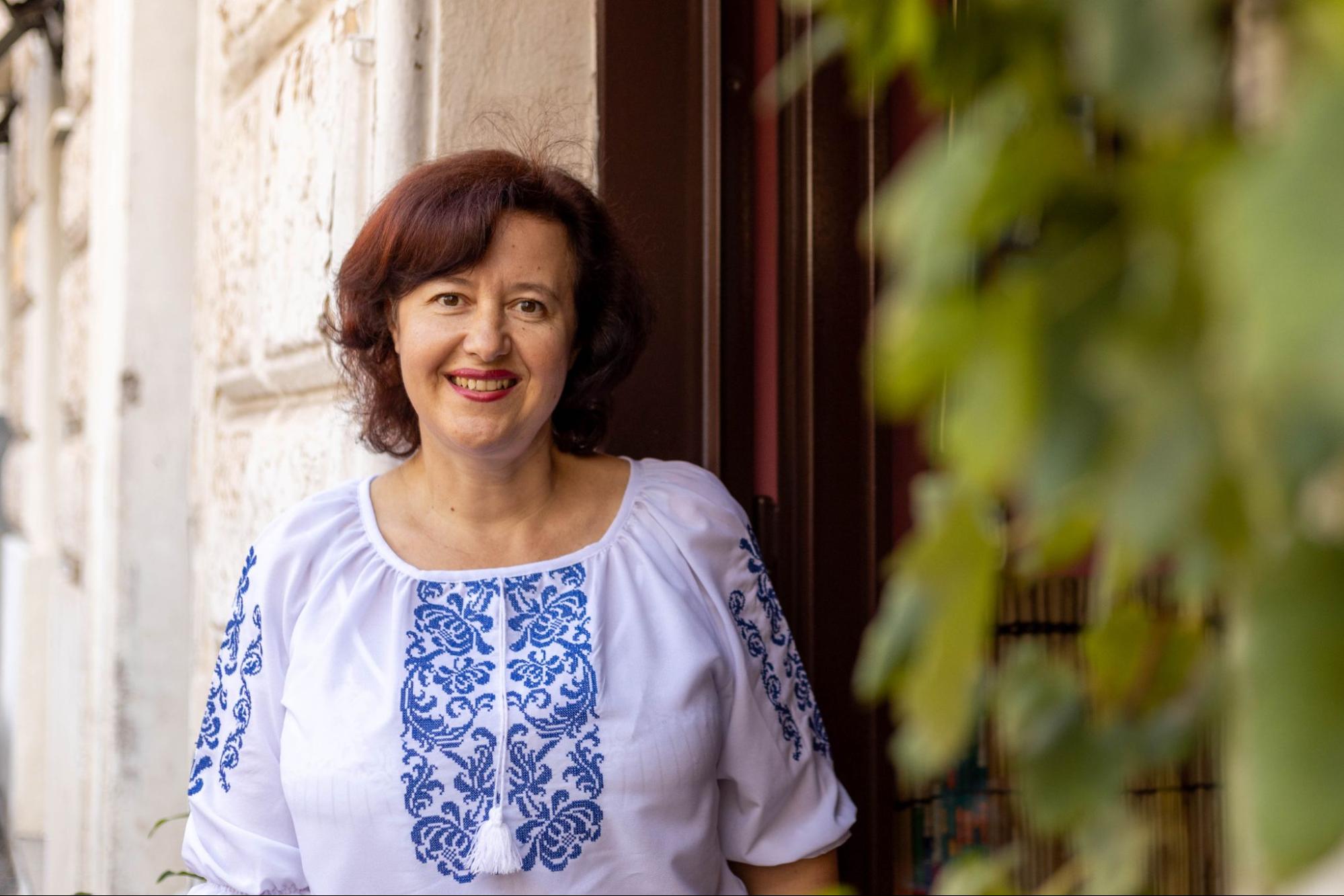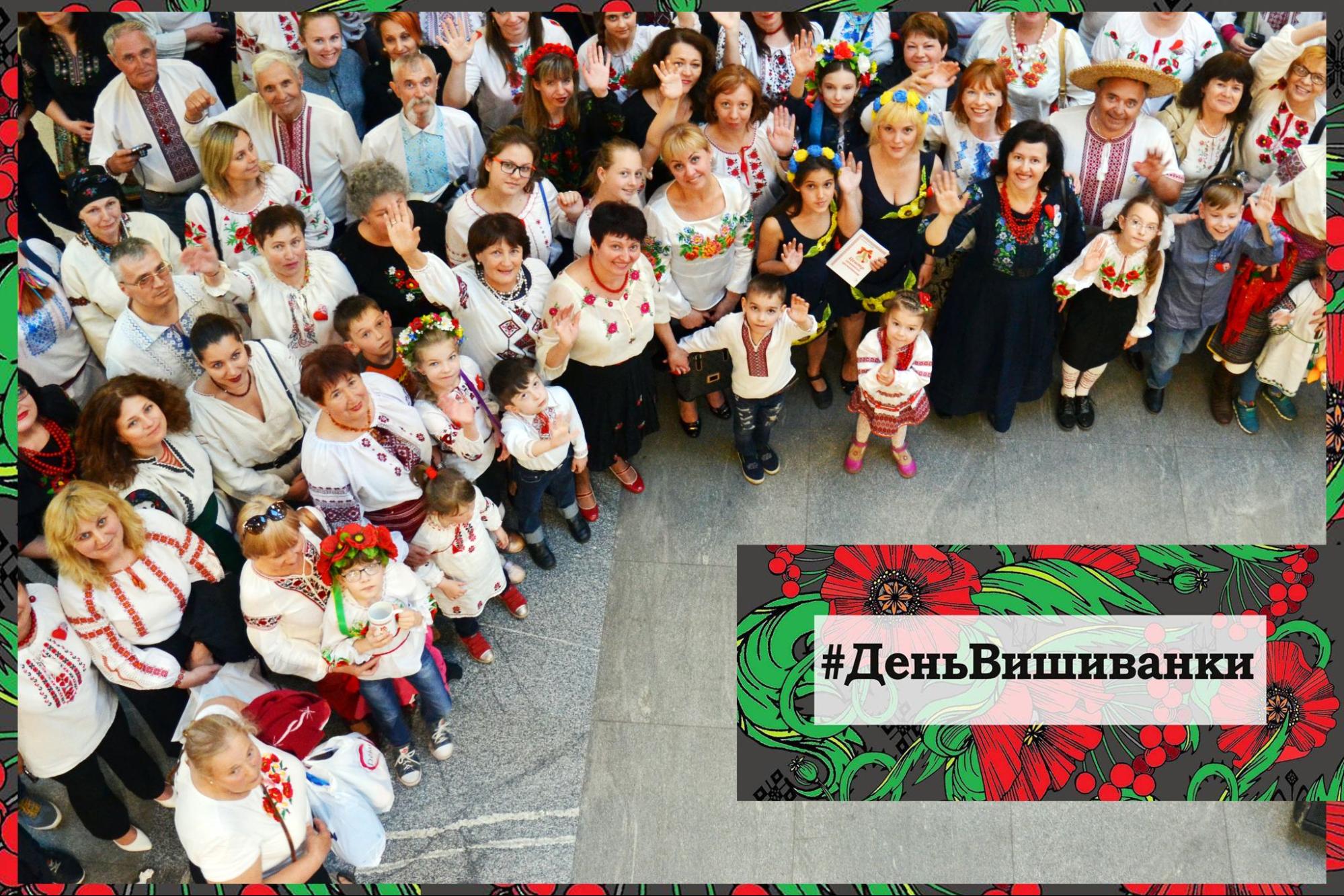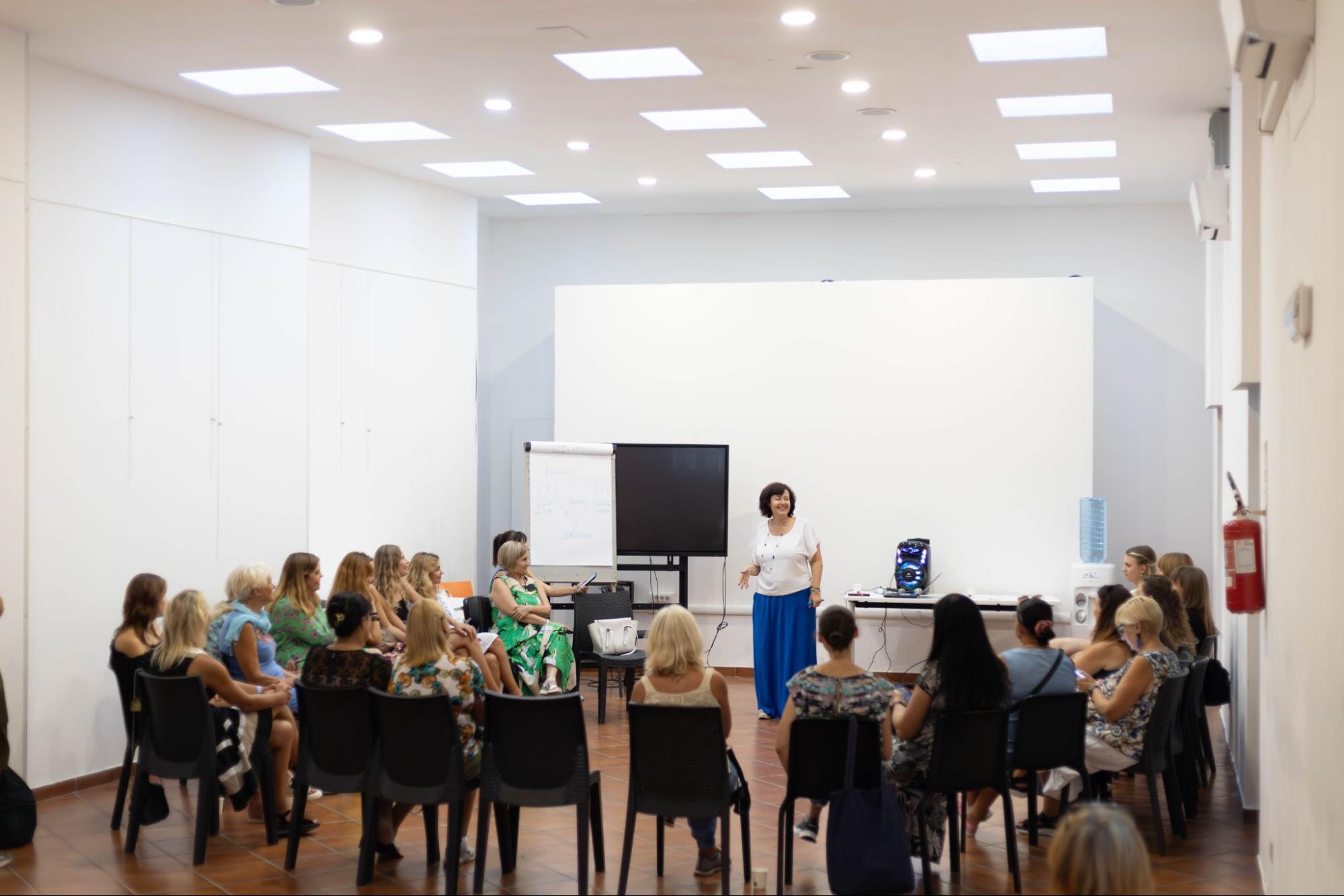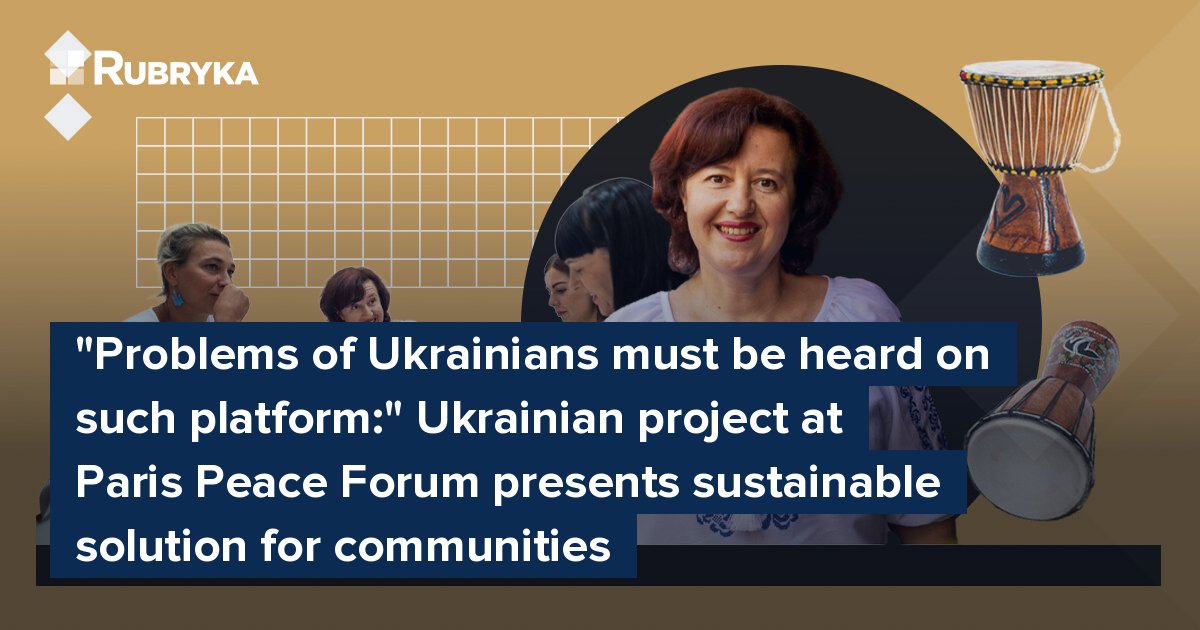
Before the 2014 war, Svitlana Lukyanchenko lived in Luhansk with her husband and children and worked at a local school. When Russia attacked Ukraine, the family was forced to move to the Dnipro. Lukyanchenko did not return to teaching in the new city but became a social activist. One of the first projects was organizing Vyshyvanka Day in the center of Dnipro.
Since then, Lukyanchenko has held more than one event with like-minded people. However, in 2022, Lukyanchenko and her sons moved to Italy due to the full-scale invasion of Russia. She did not stop her work there, giving birth to the Contact2U project. How did Lukyanchenko's team manage to get to the selected activists for the Paris Peace Forum, and what is her project? Rubryka explains.

Svitlana Lukyanchenko, executive director of the NGO Power of the Future. Photo from the heroine's archive
The beginning of the war in 2014
After the start of the war in Ukraine in 2014, her family lost everything they had, says Lukyanchenko. Favorite job at school, own house, native streets — all this remained in Luhansk. Fleeing the war, the family moved to Dnipro, chosen randomly.
At the time of the move, Lukyanchenko's eldest son was nine, and the youngest was nine months old. She gave birth to her second child around the time of the start of the shooting of youth on the Maidan during the Revolution of Dignity, when the desire for European integration and the free and democratic development of Ukraine prompted a large active part of citizens to protest against the actions of the then government.
Lukyanchenko did not work in Dnipro for about a year — she was engaged in raising her sons and getting used to the new city. Over time, she realized she did not want to return to school. She did not like the Soviet-style teaching methods. Instead, Lukyanchenko decided to develop an idea that originated in her hometown.
In Dnipro, Lukyanchenko met with Tetyana Hladkova, an equally active resettler from Donetsk. "There was a certain community of resettlers. We met to discuss common needs and problems," says Lukyanchenko.
Lukyanchenko and Hladkova formed a team around themselves. In May 2015, they registered their non-governmental organization, Power of the Future. The first event, Vyshyvanka Day festival, was held in the center of Dnipro in a few days.

Vyshyvanka Day 2017. Many resettlers and Dnipro residents gathered in the city's center during the holiday. Photo from the heroine's archive
Back then, the team organized this event without any funding. The event was announced on Facebook, and somehow, everything worked out: the shopping center provided a stage, McDonald's — balloons, and friends came to sing. Three to four hundred people joined the celebration then. The team has traditionally organized such events for several years in a row.
After registering the non-governmental organization and holding the first holiday, Lukyanchenko actively took up studies. She changed her major as a teacher to project management in activism.
What was the problem?
After the start of the war, besides Lukyanchenko and Hladkova, thousands of displaced persons came to Dnipro. They were left without support, communication, or help. The activists understood their situation very well. The Power of the Future NGO team managed to implement several projects aimed at helping displaced persons, as well as ordinary residents of the Dnipropetrovsk region. Activists wanted to unite people and give them emotions and opportunities.
"We tried to integrate and be a resource for the community, not socially passive. The success of the projects consisted of knowing the target audience well because we were IDPs ourselves, which is why we were active and included other displaced people in our activities," says Hladkova.
What solutions did the team propose?
From December 2016 to January 2017, a public reception was opened for rapid response to the problems of IDPs. It became a space for an active city community, stimulating and developing entrepreneurship, self-employment, job creation, and paying taxes to the local budget. The regional council allocated premises for the Pro-active Hub in Dnipro.
On its basis, within the framework of "Pro-active Hub: business & motivation," activists conducted seminars and training for displaced persons to involve them in social and economic life by creating small and medium-sized businesses.

2017, a project supported by the Council of Europe Business and Motivation. Photo from the heroine's archive
Also, the NGO Power of the Future created Artists of Accord — an educational project for teachers, psychologists, social workers, and public figures.
"This project is already five years old. We share how to make the school innovative, modern, positive, and non-conflicting. We train teachers how to resolve conflicts," says Lukyanchenko.

2019, educational project Artists of Accord, strategic session. Photo from the heroine's archive
Also among the activists' projects were those aimed at the search for identity and reproduction of national traditions. For example, Ethnodiving is a tour of the Dnipropetrovsk region that allows people to immerse themselves in the ethnic space of the area and feel their identity.
Also, before the full-scale invasion, the NGO team held a series of festivals, Shine. Circle of the Heart. Activists brought the holiday to 15 cities and villages of the Dnipropetrovsk region. At each location, an interactive drum circle, a global method of uniting people into teams, handmade master classes, and a playback theater performance were held, becoming a platform for sincere communication and compassion among ordinary people.
You can read more about the projects on the organization's website.
During the work of the Power of the Future NGO, it was possible to create two communities. "These are 150 teachers from Dnipro and the region in Artists of Accord and about 400 people from among the resettlers who attended our events. They receive constant support from the organization," says Lukyanchenko.
The activist adds that she was involved in creating a procedure or mechanism by which displaced people can get housing.
Moving to Italy
In March 2022, after the start of a full-scale invasion of Russia, Lukyanchenko gathered her sons and belongings and left abroad. She says that then, the protective mechanisms kicked in. "I couldn't sit here for a long time and was under stress because this is already the second big move in my life. I understood that the war is not for one week," Lukyanchenko shares.
Together with her sons, she left through Poland for Italy. She settled in Taranto, where she had friends. The family was given a room in a hostel free of charge.
"It was much easier for me in Dnipro in 2014 than in Italy in 2022. Luhansk and Dnipro are one country, one language, and I could immediately be involved in certain processes. It was more difficult in Italy because there was a language barrier. I could not communicate at my intellectual level. Of course, I learned the language a little, but it was not the level of communication I was used to in Ukraine," Lukyanchenko recalls.
As soon as she settled a little, the activist began to join the activities of the Ukrainian community in Taranto. And then she created her own project.
It was a project to support refugee women and combat slavery and violence. They held four meetings, which attracted about 50 women. A circle of support and communication was created for them. Small success stories were indicative. For example, the girls started doing morning gymnastics together, went for coffee, and organized supportive practices that improved a person's emotional state in emigration.

During one of the meetings. Photo from the heroine's archive
One of the project participants, Olena Dotsenko, says it helped her cope with a turning point and not be alone with her problems.
"I only arrived in Italy a month ago. I didn't know anyone yet and was happy to join the event. In this way, I got to know the community that supported me in adaptation. I was exhausted then, and the girls took me into their hands. We practiced yoga, went to the pool, and had coffee. That's how I recovered. It was vital for my immersion in Italian life," says Dotsenko.
In Dnipro, the Contact2U project has started work from the NGO Power of the Future. Within its limits, the resettled people received psychological and informational support. IDPs could attend various events: networking, workshops, and physical activity recovery classes. During the meetings, a creative component was necessarily involved: joint singing in the single circle technique, collaborative drawing, and performance of various art techniques.
A similar project was launched in Rome in 2023. "We did hybrid networking, meetings with psychologists, and also formed a community in Rome so that people could make new acquaintances," says Lukyanchenko.

Networking in Rome, 2023, Rome project Соntact2U. Photo from the heroine's archive
"At the meetings in Rome, I received support and resource communication, where my creative abilities were revealed. After them, I felt more confident. I used the techniques I received at the meetings in my everyday life. New friends appeared," says Mariia Pavlyuk, a Ukrainian who came to Italy with her son and daughter.
Paris Peace Forum and coming home
In September 2023, it became known that the Contact2U project was selected for the Paris Peace Forum. This November, the team will present its experience using the latest approach, "Community-based social healing," community healing through art. The application for participation was sent in the spring.
"We will talk about a sustainable solution for communities: how to support people going through difficult transformational processes related to war. I am proud that we got into the list of 50 selected projects. It is essential that the problems of people from Ukraine be heard on such a platform," says Lukyanchenko.
Contact2U is the only Ukrainian project among other participants of the Paris Peace Forum.
Shortly before the release of this material, Lukyanchenko returned to Ukraine. She says that she wanted to go home. Her motherland will continue developing projects, particularly foreign ones, for resettlers and implementing new ones.

Talking about Ukraine through dance: a Ukrainian teaches the British to dance hopak and flamenco

"Wars start with communications, but they also end with them": a Ukrainian communications specialist helps domestic NGOs speak to the world from abroad

Yana Koretska: "I feel my mission is to tell Irish people about Ukrainian culture"





